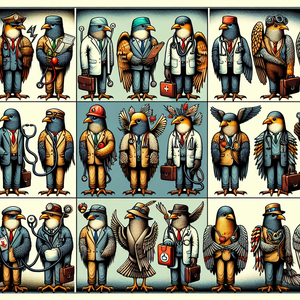Bridging the Gap: UAB Careers in Interdisciplinary Fields

Interdisciplinary careers are vital in addressing the multifaceted challenges faced by society today. As fields such as healthcare, technology, and social sciences converge, professionals equipped with a diverse skill set and the ability to think critically across disciplines are increasingly sought after. UAB recognizes this trend and has tailored its programs to equip students with the tools necessary to thrive in these dynamic environments. The demand for interdisciplinary professionals is evidenced by the increasing complexity of societal issues, such as public health crises, technological advancements, and social inequalities, which require integrated approaches for effective solutions.
Emerging Interdisciplinary Opportunities at UAB
UAB offers various interdisciplinary career opportunities, including healthcare technology integration, public health and social justice, and biomedical engineering and design thinking.
Healthcare Technology Integration
The intersection of healthcare and technology presents vast opportunities for UAB graduates. The rise of telemedicine, electronic health records, and health data analytics necessitates professionals who can navigate both medical knowledge and technological proficiency. UAB's Health Informatics program exemplifies this approach, offering coursework that integrates healthcare practices with data science and IT solutions. Students learn to design and implement systems that improve patient care and streamline healthcare delivery.
Public Health and Social Justice
UAB's commitment to social justice is reflected in its interdisciplinary programs that merge public health with social science research. Students can engage in initiatives that address health disparities and develop policies aimed at improving community health outcomes. The UAB School of Public Health encourages collaboration across disciplines, allowing students to work on projects that analyze the social determinants of health.
Biomedical Engineering and Design Thinking
The field of biomedical engineering at UAB emphasizes innovation through design thinking—a method that encourages problem-solving through collaboration across disciplines. Students learn to develop medical devices and solutions tailored to patient needs, merging engineering principles with insights from healthcare providers.
Preparing for Interdisciplinary Careers at UAB
To thrive in these emerging fields, students should take the following steps: Engage in Interdisciplinary Studies, Participate in Collaborative Projects, Develop Soft Skills, and Network with Alumni.
As UAB continues to foster innovative interdisciplinary programs, students are uniquely positioned to embrace the future of work. By engaging in diverse fields and acquiring a multifaceted skill set, they can effectively address the challenges of tomorrow. The university's commitment to interdisciplinary education not only enriches the student experience but also prepares graduates to become leaders in their respective fields. With the right preparation and mindset, UAB students can bridge the gap between disciplines and carve out meaningful careers that make a lasting impact. As the landscape of work evolves, UAB graduates are poised to be at the forefront of this transformation, equipped with the knowledge and skills necessary to thrive in an interconnected world.
Health Informatics Specialist
Hospitals, healthcare technology companies (e.g., Epic Systems, Cerner), public health organizations
Core Responsibilities
Develop and implement health information systems that improve patient care and operational efficiency in healthcare settings.
Analyze health data using predictive analytics to support clinical decision-making and enhance patient outcomes.
Collaborate with healthcare providers to understand workflow processes and identify areas for technology integration.
Required Skills
Proficiency in health information technology and data analytics tools (e.g., SQL, Tableau).
Strong understanding of clinical workflows and healthcare regulations (e.g., HIPAA).
Excellent communication and project management skills.
Public Health Policy Analyst
Government agencies (e.g., CDC, WHO), non-profit organizations, research institutions
Core Responsibilities
Conduct research on public health issues to inform policy development and advocacy efforts.
Analyze data on health disparities, social determinants of health, and community health outcomes.
Collaborate with community organizations to develop evidence-based public health initiatives and programs.
Required Skills
Strong analytical skills with experience in statistical software (e.g., SPSS, R).
Knowledge of public health laws, regulations, and ethical considerations.
Excellent writing and presentation skills for conveying complex information to diverse audiences.
Biomedical Device Design Engineer
Medical device manufacturers (e.g., Medtronic, Boston Scientific), research labs, universities
Core Responsibilities
Design and prototype medical devices that meet regulatory standards and address specific healthcare needs.
Collaborate with healthcare professionals to gather insights on patient requirements and usability.
Conduct rigorous testing and validation of prototypes to ensure safety and effectiveness.
Required Skills
Proficiency in CAD software (e.g., SolidWorks) and familiarity with biomedical engineering principles.
Strong problem-solving skills and creativity in design thinking approaches.
Knowledge of FDA regulations and quality assurance processes.
Telehealth Program Coordinator
Hospitals, telehealth service providers, healthcare consulting firms
Core Responsibilities
Manage the development and implementation of telehealth services, ensuring compliance with healthcare regulations.
Evaluate program effectiveness through data collection and analysis, making recommendations for improvements.
Serve as a liaison between healthcare providers and patients to facilitate access to telehealth resources.
Required Skills
Strong understanding of telehealth technologies and healthcare delivery systems.
Excellent organizational and communication skills, with an ability to work across multiple teams.
Experience with project management and program evaluation methodologies.
Social Epidemiologist
Academic institutions, public health agencies, non-profit organizations focused on health equity
Core Responsibilities
Conduct research to investigate the impact of social factors on health outcomes within various populations.
Analyze epidemiological data to identify trends and disparities in health and access to healthcare services.
Collaborate with public health officials to develop strategies aimed at improving health equity and community well-being.
Required Skills
Expertise in epidemiological methods and statistical analysis software (e.g., SAS, Stata).
Strong critical thinking and problem-solving abilities to address complex health issues.
Excellent communication skills to present findings to stakeholders and policymakers.


